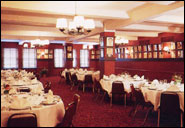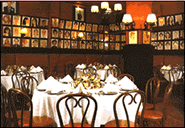

A Fondness for Pickles
by Tragic Rabbit
14:05
“Mother, please,” Perry repeated, glancing around at the other restaurant patrons. The Eugenia Room seemed unusually populated for a weeknight.
“What, dear?”
“Must you….” Perry coughed, napkin to his lips. He looked at the yellow roses at the table’s center, swallowing hard. “Could you…speak a bit more quietly, Mother? People are looking.”
She laughed, a raucous tinkling that charmed men by the dozens when she was a debutante, but now only seemed a little strained. She was still a lovely woman, though: slender, groomed at the best Manhattan salons and dressed by the most exclusive shops. Her smooth fingernails gleamed in the restaurant’s low, elegant lighting, which also flattered her face, making the network of fine lines around her mouth and blue eyes much harder to detect.
“Darling, you must learn to think less of yourself. The world doesn’t center around you; no one is ‘looking.’” Here she preened. “Though if they were—“
“Yes, Mother.” Perry said hastily. “And how are your crab cakes?”
These Tuesday night dinners were so predictable: awkward yet reassuring on some atavistic level. He and Mother had kept up the tradition of weekly dinners in Sardi’s Eugenia Room for nearly twenty years, ever since he’d come back that final time from New Haven, graduating with mediocre grades from Yale Law School after more years than his father had thought reasonable.
Still, the old man had paid the bills, found his son a respectable position in the respectable firm of an old friend, bought his son’s way into a good address and then conveniently expired only a year after Perry’s less than triumphal return. Neither he nor Mother had been overly distraught; the old fellow had spent far more time at his club than in his and his wife’s fashionable Manhattan apartment. It had always been Perry and Mother, in any case, whether summering in Capri or attending concerts and symphonies. Well, except for--
“Perry, do pay attention.”
“I’m sorry, Mother,” said Perry, contrite. “What were you saying?”
“I don’t know why I bother. It does take at least two to make conversation. Sometimes you’re just like your father.” She frowned prettily and picked up her fork.
“I’m sorry, Mother, just ...woolgathering. I don’t feel very well; I think I might have a cold coming on. Are your crab cakes good tonight?”
She frowned again, patted her lips with the napkin, and minutely examined Perry’s face.
“Never mind the crab cakes. You do look pale. Have you been taking all your vitamins?”
Perry sighed. “Of course, Mother.”
“Well, this isn’t a good time to come down with something. Faye and I have set up that lovely dinner for you and Deborah, you know. Or have you forgotten?”
Perry flinched. “No, Mother, of course not… I just don’t feel very--”
“Perry,” she interrupted, her voice firm. He knew that tone. “You know how important it is to Faye and me that the two of you get things decently arranged. June is perfect for weddings, and Faye has already booked--”
“Yes, Mother, I know. I know.” Perry looked around the room, anywhere but into his mother’s face. She studied him for a moment without speaking. Around them were the clinks of tableware and the susurrus of conversation, all disconnected from the circle of their table, their lives.
“This isn’t about Pickles, is it?” she asked unexpectedly.
Startled, Perry looked up into her ice-blue eyes. “What?”
Unfazed, she asked, “Is this about Pickles?”
Sweat broke on Perry’s forehead; he reached for the linen napkin, and then fiddled with it, twisting it between his fingers.
“I don’t know what you mean,” he finally said.
“Oh, bosh. I know you and Pickles were very comfortable living together--”
“Mother, please!” Perry hissed, staring around their table wildly, nervously.
She continued as if he hadn’t spoken, ignoring the waiter who silently refilled their glasses and departed.
“But the fact is, darling, that you’re alone now, and in any case, I’m sure Pickles would have approved of Deborah. She’s a lovely girl, from a fine old family. You’re lucky to get such a young girl at your age, dear; though to be honest, she’ll do quite well out of it herself, what with your trust fund and your--”
“Mother!” he begged in a rough whisper. He leaned his face down into the wrinkled napkin in his hands, giving up on propriety and appearances. His dinner lay untouched on the bone china plate. He wished for the ability to be teleported that he’d read about in Worlds of if, a science fiction magazine his mother had found, and thrown out, when he was fifteen. ‘Trashy,’ she’d called it, more offended than if it had been pornography. Frankly, he’d enjoyed the science fiction a lot more than those well-worn copies of Playboy he’d found in his father’s desk. Other worlds, alternate possibilities, lives lived differently from his own: each story asking, what if?
What if…and if only…
Oh, to simply disappear from the table at Sardi’s and reappear…where? Better yet, when? What if he could go back in time, too, and reappear back in his apartment, back before it was so lonely, so empty--
“Are you listening to me, Perry?” His mother’s sharp voice cut into his thoughts like a scythe. He blinked and looked up, at her face; he was too well trained to do otherwise.
“What?” At her expression, he paused, sighed and swallowed, “I mean, yes, Mother, of course I’m listening. Just not feeling well.”
She shook her head. “No, you’re being difficult, I can tell, and there’s no reason for it, no reason at all. Pickles would have expected you to get married, no matter how well the two of you got along.”
“Mother!”
“I mean really; Pickles would probably be married by now, too, if--”
“Mother!”
“If Pickles hadn’t died. If your roommate were alive, I’m sure Pickles would have made a lovely match with someone nice, too, just like you have, and be the first one to congratulate--”
“Mother, stop it!”
“Darling, I know you miss your friend, but Pickles is dead, you know, and life does go on. And after all, as you both told me many times, Pickles was just your--”
Perry threw his napkin down on his uneaten dinner and stood up. Her pause was infinitesimal; her words continued, her voice persistent.
“Just your roommate, you know, it’s not as if you’ve been widowed the way I have. You can’t go on living alone forever. Pickles wouldn’t have wanted--”
“Shut up, Mother, just please, please shut up!”
She stared up at him, astounded. Perry looked at his mother, and then away. Her eyes narrowed as she looked at him, one long fingernail tapping the side of her crystal water glass, producing a high, clear musical note. A few patrons at nearby tables were looking in their direction.
“I thought you didn’t want a scene,” she said, arching one frosty eyebrow, her anger contained but close to the surface, visible in her wintry eyes and the taut line of her mouth.
Perry looked away. He stood there before her awkwardly, feeling uncomfortable, publicly conspicuous, and much, much younger than his forty-two years. His forehead was sweating. He suddenly imagined, incongruously, exactly what Pickles would say, and in what sort of amused tone, about Perry telling Mother to shut up right in the middle of Sardi’s. And Pickles was so wonderfully able to mimic Mother…
Perry giggled.
Now his mother glowered; there was no other word for it. “Sit down, Perry. Now.” Her voice was glacial.
Perry sat, stifling laughter, Pickles’ merry voice echoing in his mind. His mother stared directly into his eyes, tapping at the glass again, waiting without patience. Perry’s laughter died inside him, and he closed his eyes for a moment, then opened them to gaze directly into his mother’s eyes.
“Mother, I don’t want a scene but I don’t need you to tell me that Pickles is dead. I know it every day, every single day; I know it when I wake up alone in an empty apartment, with no one to talk to; I know it every night when I go to sleep.”
She opened her mouth, but he held up a restraining hand, not finished. She closed her mouth.
“Mother, it’s been nearly four years and it feels like yesterday: Pickles dying, Pickles dead, Pickles gone.”
His mother looked away without speaking.
He stared at her, willing her to hear him, to really hear him. “Do you understand, Mother? Like yesterday.”
She sighed, suddenly looking her age. “Yes, dear, I understand. You miss Pickles. I know that, everyone knows that. I just don’t see what that has to do with marrying Deborah. In fact, you’d be less alone, you know, in that apartment. Not all marriages are like mine and your father’s,” she added, a trifle bitterly. “Some married couples actually manage to…spend time together.” She pushed her unused table knife back and forth with one slender, professionally manicured finger.
Perry looked at her-- at her beautifully coifed blonde hair, artfully dyed to conceal the grey that even a devoted son knew was surely there, and at the single row of perfectly matched pearls at her neck. He laid his left hand atop her right, stopping the nervous machination of the silverware. He waved away the cautiously approaching waiter.
“Mother.” he said softly. Her eyes were on his hand. Possibly they glistened with tears, but it was hard to know in the low light.
“Mother?”
She looked up into his eyes, a darker blue than her own. There were tears in her eyes, yes, unshed. Words unspoken, too, he thought, years and decades of so many uneasy silences. He took a deep breath.
“Mother, I’m not going to marry Deborah.”
That shocked her out of her own regrets. She scowled, tears or no.
“Now you listen to me, Perry--”
He held up his free right hand, gently speaking over her voice, “No, no, you listen, Mother, please. To me. Just…for a moment. Please?”
She sighed, nodded. Perry squeezed her right hand gently and continued to hold it as he spoke quietly, carefully.
“Thank you, Mother, I appreciate it.”
She nodded again, silent, looking down at her hand in his. The platinum ring on his third finger was tastefully slim, she thought; Pickles always had had such a discerning eye and gave such exquisite gifts--to both of them, in fact. The three of them had always gotten on well, she remembered; Pickles was wonderful company and so charming. Odd that she hadn’t noticed till just now that Perry still wore the ring…
“Mother?”
She looked up vaguely. “Yes, dear, I’m sorry. I am listening. I was just thinking of Pickles.”
“What about Pickles?”
“Well, that nickname for one thing, dear.” She didn’t notice her son’s brief smile as he lifted his wineglass.
“Just a college thing, Mother, not really very--”
“Oh, I know, I know. Pickles told me all about it.”
Perry choked on a sip of wine. “What?”
“Certainly,” she laughed, becoming more animated, more girlish, “do you think we never talked without you around?”
“Well, no, but…”
Her smile was fond, reminiscent, and a little smug. “Yes, that famous, silly predilection for pickles… and not just any pickles, mind you, not those itty-bitty tiny ones but the really, really big--”
“Mother!” Perry choked again on the wine, then set the glass down hard on the table. He coughed to cover his embarrassment.
“What, dear?”
His mother’s smile was catlike, hard to read. He took a deep breath and spoke firmly.
“Mother, I’m not marrying Deborah. No offense to Deborah or Faye, but I’m not marrying anyone. There was only one person I ever wanted to marry and that wasn’t possible, so I guess, well, Mother, I guess you’ll just have to tell your bridge friends that I’m a…a… confirmed bachelor, or something. I’m sorry for the…embarrassment and all, but it just can’t be helped. I can’t marry Deborah.” He gave a forced laugh, nervously trying to gauge his mother’s expression.
She looked at his anxious face, glanced once around the briskly busy restaurant, then turned back to their table before looking down at the platinum band on her son’s left hand.
She said nothing. Moments passed in silence. He watched her.
“Mother?” he asked tentatively.
She reached for her Gucci handbag, pulled out a gold compact and examined her face.
Without looking up or answering, she said, “Wave that waiter over and pay the check, will you, dear?”
Perry exhaled hard and did as she asked.
“Yes, Mother.”
She snapped the compact shut with a brisk click.
A Fondness for Pickles is a TR short story and, as such, belongs to him alone, by statute and by right.

Sardi’s Restaurant has been located at 234 West 44th Street in NYC since 1921, and is not responsible for the content of this story, but does serve fabulous crab cakes...among other wonderful entrées. Call 212-221-8440 between 11 am and 5 pm for reservations. Bon Appétit!
